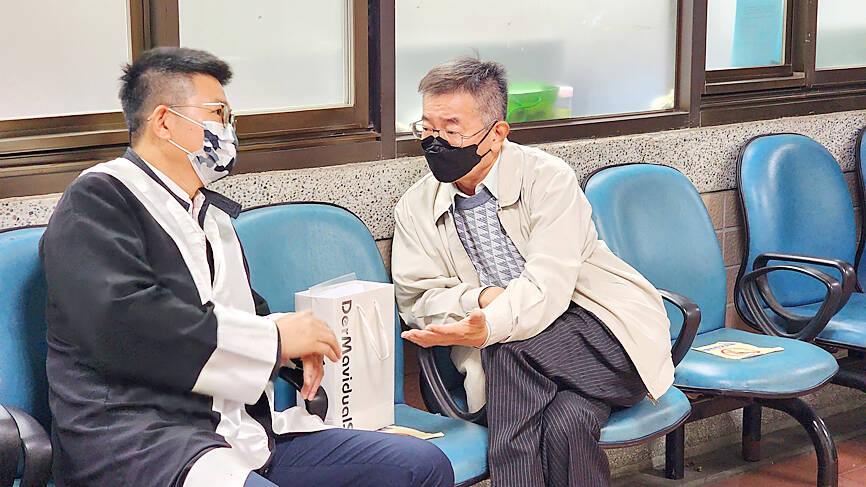Former lawmaker Lo Chih-ming (羅志明) and retired rear admiral Hsia Fu-hsiang (夏復翔) have been indicted on espionage charges for allegedly developing a spy network for China and inviting military retirees to meet Chinese government officials.
Kaohsiung prosecutors announced the indictment yesterday, citing evidence and witness testimony that Lo — a former legislator for the Taiwan Solidarity Union — and retired naval rear admiral Hsia began their efforts in 2013 after being recruited by the Chinese military and United Front Work Department.
Lo and Hsia were charged for contravening the National Security Act (國家安全法) on evidence of inviting and accompanying several retired military officers, 48 ranked as generals or major generals, on 13 trips to China from 2013 to 2019, Kaohsiung deputy head prosecutor Hsu Hung-ju (徐弘儒) said.

Photo: CNA
Many were lured by financial incentives and passed confidential material to China, among other espionage activities, while Lo and Hsia built spy networks, Hsu said.
Lo and Hsia allegedly led the trips to events organized by Beijing, including a gathering for alumni of the Whampoa Military Academy, the Zhuhai International Airshow and golf competitions.
The trips were paid for by Beijing, and Taiwanese military personnel were treated like VIPs while attending banquets and conferences, Hsu said.
Lo befriended Hsia while playing golf together, and through Lo’s business connections, he became acquainted with Li Ying (李鷹), a Chinese biotechnology firm chairman who had extensive ties with the Chinese military, investigators said.
As deputy head of the navy’s Political Warfare Section, Hsia attended events in China and was introduced to former Chinese United Front Work Department section heads Hao Yifong (郝一峰) and Fang Xinsheng (方新生), Hsu said.
Through these connections, Lo and Hsia were recruited and paid to bring retired generals and other officers to junket trips to China, where they were likely influenced by Beijing officials and convinced to conduct espionage, Hsu said.
Separately, Kaohsiung City Councilor Chang Po-yang (張博洋) of the Taiwan Statebuilding Party accused the Mainland Affairs Council (MAC) and other ministries of neglecting to draft laws to prevent elected officials from attending political meetings in an enemy state.
Chang said he was referring to Chinese Nationalist Party (KMT) politicians visiting China to attend Whampoa Military Academy anniversary functions, along with other junket trips to China.
Most recently, KMT Taoyuan City Council Speaker Chiu Yi-sheng (邱奕勝) led a 24-member delegation of city councilors and their spouses to Shanghai, and met United Front Work Office Shanghai chairman Chen Tong (陳通) on Tuesday, Chang said.
There was also a trip to Beijing last month led by Kaohsiung borough warden Liu Chi-fang (劉啟芳), also of the KMT, in which a 52-member group comprised of other wardens and community organization directors attended a conference chaired by China’s top Taiwan Affairs Office official, Song Tao (宋濤), Chang said.
He criticized MAC for saying that Taiwan has no law banning officials from such engagement with China, saying that lack of such a law allowed officials to meet with officials of an enemy state.

DEFENSE: The National Security Bureau promised to expand communication and intelligence cooperation with global partners and enhance its strategic analytical skills China has not only increased military exercises and “gray zone” tactics against Taiwan this year, but also continues to recruit military personnel for espionage, the National Security Bureau (NSB) said yesterday in a report to the Legislative Yuan. The bureau submitted the report ahead of NSB Director-General Tsai Ming-yen’s (蔡明彥) appearance before the Foreign and National Defense Committee today. Last year, the Chinese People’s Liberation Army (PLA) conducted “Joint Sword-2024A and B” military exercises targeting Taiwan and carried out 40 combat readiness patrols, the bureau said. In addition, Chinese military aircraft entered Taiwan’s airspace 3,070 times last year, up about

A magnitude 4.3 earthquake struck eastern Taiwan's Hualien County at 8:31am today, according to the Central Weather Administration (CWA). The epicenter of the temblor was located in Hualien County, about 70.3 kilometers south southwest of Hualien County Hall, at a depth of 23.2km, according to the administration. There were no immediate reports of damage resulting from the quake. The earthquake's intensity, which gauges the actual effect of a temblor, was highest in Taitung County, where it measured 3 on Taiwan's 7-tier intensity scale. The quake also measured an intensity of 2 in Hualien and Nantou counties, the CWA said.

The Overseas Community Affairs Council (OCAC) yesterday announced a fundraising campaign to support survivors of the magnitude 7.7 earthquake that struck Myanmar on March 28, with two prayer events scheduled in Taipei and Taichung later this week. “While initial rescue operations have concluded [in Myanmar], many survivors are now facing increasingly difficult living conditions,” OCAC Minister Hsu Chia-ching (徐佳青) told a news conference in Taipei. The fundraising campaign, which runs through May 31, is focused on supporting the reconstruction of damaged overseas compatriot schools, assisting students from Myanmar in Taiwan, and providing essential items, such as drinking water, food and medical supplies,

New Party Deputy Secretary-General You Chih-pin (游智彬) this morning went to the National Immigration Agency (NIA) to “turn himself in” after being notified that he had failed to provide proof of having renounced his Chinese household registration. He was one of more than 10,000 naturalized Taiwanese citizens from China who were informed by the NIA that their Taiwanese citizenship might be revoked if they fail to provide the proof in three months, people familiar with the matter said. You said he has proof that he had renounced his Chinese household registration and demanded the NIA provide proof that he still had Chinese